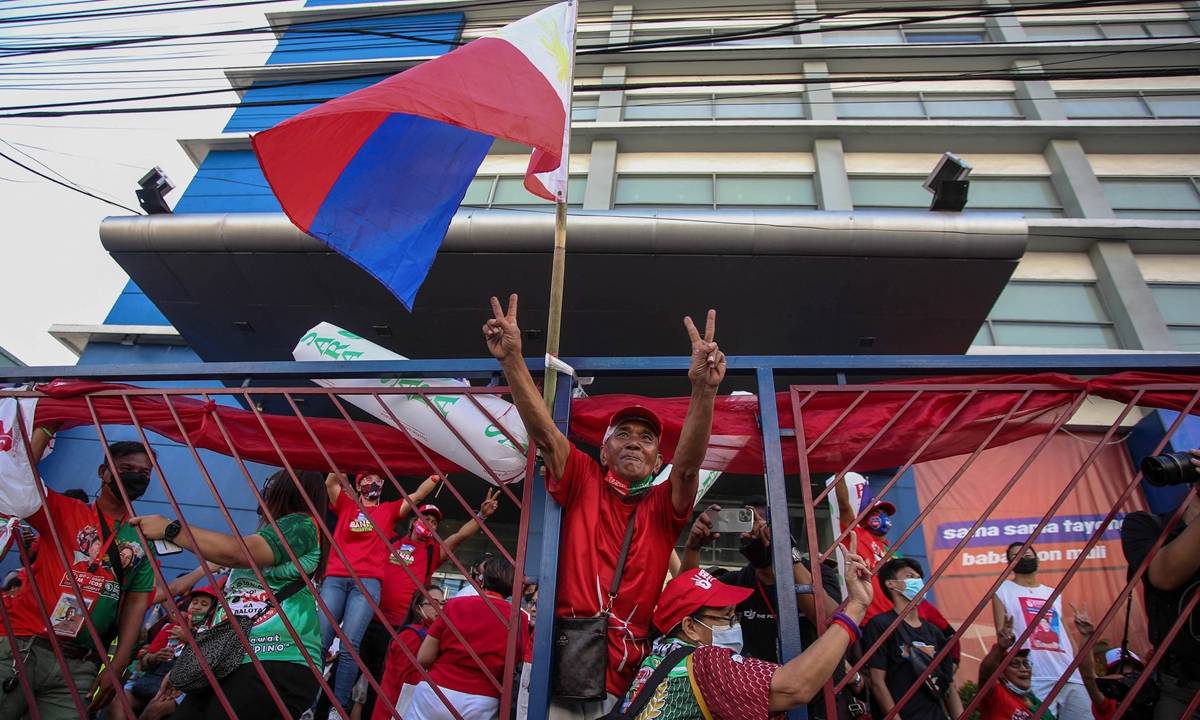Supporters of Ferdinand Marcos, Jr. celebrate outside his campaign headquarters after his landslide presidential election victory, in Mandaluyong City, Metro Manila, on May 10, 2022. Photo: AFP
Supporters of Ferdinand Marcos, Jr. celebrate outside his campaign headquarters after his landslide presidential election victory, in Mandaluyong City, Metro Manila, on May 10, 2022. Photo: AFP
Ferdinand Marcos, Jr., son of former Philippine president Ferdinand Marcos, won by a landslide in the Philippines' presidential election on Tuesday over his rival, current Vice President Leni Robredo.
Experts believe that the new Philippine leader will likely carry on with Duterte's foreign policy in maintaining close ties with China, but warned that growing US interference and a rising nationalist sentiment domestically could raise challenges and uncertainties in its dealing with China on the South China Sea.
An unofficial tally showed Marcos, Jr., popularly known as "Bongbong," had surpassed 27.5 million votes, 36 years after his father stepped down in 1986, Reuters reported.
Marcos, Jr. had more than 30.8 million votes in the unofficial results with more than 97 percent of the votes tabulated as of Tuesday afternoon. Robredo had 14.7 million votes, and boxing great Manny Pacquiao had 3.5 million, AP reported on Tuesday.
The 64-year-old Marcos, Jr. vowed to unify the country as he made sweeping promises on the campaign trail to boost jobs and tackle rising prices as part of a pathway out of the pandemic, AFP reported. "Unity is my cause because of my firm belief that unity is the first step towards getting out of this crisis we are now in," he said in February.
China congratulated the smooth process of the Philippine presidential election and the winning candidates, said Chinese Foreign Ministry spokesperson Zhao Lijian on Tuesday, expressing hope that political powers in the Philippines will continue to work together on national development and recovery.
Zhao noted that the traditional friendship between China and the Philippines is long-lasting, and ties have been upgrading in a steady manner in recent years. China will continue to maintain close ties with its neighbor and further expand win-win results.
Experts saw Marcos, Jr.'s victory as a good sign for maintaining close China-Philippine ties, as the new president, known for his pragmatic political views, stressed that he may carry on the policies of Duterte, including the South China Sea issue.
Herman Tiu Laurel, founder of Philippine-BRICS Strategic Studies, told the Global Times that Marcos, Jr. "will definitely continue to engage China in dialogue and negotiations" to arrive at "win-win" solutions.
However, a number of factors, such as growing pressure from the West, rising nationalist sentiment domestically, and the shadow left by Marcos, Jr.'s father's controversial two-decade rule, could weigh on the new Philippine leader and bring challenges to bilateral relations.
Marcos, Sr. was the president of the Philippines from 1965 to 1986. He ruled under martial law from 1972 until 1981 and kept most of his martial law powers until he was deposed in 1986. As one of the most controversial leaders of the 20th century, his rule was criticized by opponents for "corruption and extravagance."




No comments yet
Be the first to share your thoughts!